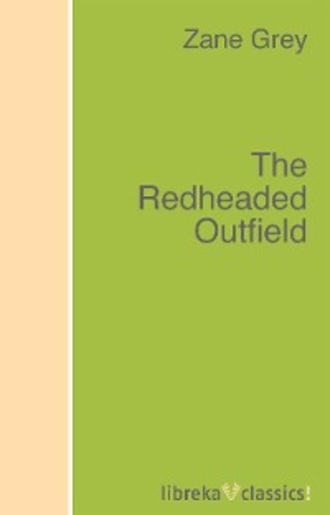
Полная версия
The Redheaded Outfield


Titel: The Redheaded Outfield
von Scott Hemphill, L. M. Montgomery, L. Frank Baum, John Milton, René Descartes, Baroness Emmuska Orczy Orczy, Karl Marx, Friedrich Engels, Edgar Rice Burroughs, Unknown, Norman F. Joly, Norman Coombs, David Slowinski, Mark Twain, Henry David Thoreau, Stephen Crane, John Goodwin, Nathaniel Hawthorne, Winn Schwartau, Odd De Presno, Sir Walter Scott, Jules Verne, Mary Wollstonecraft Shelley, United States. Central Intelligence Agency, United States, Canada, Willa Sibert Cather, Anthony Hope, Edwin Abbott Abbott, Charles Dickens, Frederick Douglass, William Shakespeare, Bruce Sterling, Franklin Delano Roosevelt, Jane Austen, Thomas Hardy, Sir Arthur Conan Doyle, Edna St. Vincent Millay, Gene Stratton-Porter, Richard McGowan, Frances Hodgson Burnett, United States. Bureau of the Census, Electronic Frontier Foundation, Robert Louis Stevenson, Anonymous, Jerry Bonnell, Robert Nemiroff, Andrew Lang, G. K. Chesterton, John Bunyan, Sunzi 6th cent. B.C., Harold Frederic, Mary Wollstonecraft, Victor Hugo, René Doumic, Upton Sinclair, Virginia Woolf, George Eliot, Thomas Paine, Benjamin Franklin, Plato, Samuel Taylor Coleridge, Ruth M. Sprague, William Dean Howells, Wilkie Collins, Jean Webster, H. G. Wells, Kate Chopin, Mark Eliot Laxer, Louisa May Alcott, Frank Norris, Edith Wharton, S. D. Humphrey, Henry Hunt Snelling, William Morris, Mrs. Susanna Rowson, Christopher Morley, Sax Rohmer, Oscar Wilde, Gaston Leroux, Henry James, Project Gutenberg, Harriet Beecher Stowe, Various, Robert W. Service, A. B. Paterson, Henry Lawson, Jack London, Laozi, D. H. Lawrence, Julius Caesar, Joseph Conrad, W. Somerset Maugham, George MacDonald, Marcus Tullius Cicero, Virgil, Theodore Dreiser, Giuseppe Salza, Rudyard Kipling, ca. 50 BCE-16 BCE Sextus Propertius, Robert A. Harris, William Wells Brown, graf Leo Tolstoy, Omar Khayyám, Michael Hart, Library of Congress. Copyright Office, Coalition for Networked Information, Geoffrey Chaucer, Adam Lindsay Gordon, Hiram Corson, Robert Browning, Amy Lowell, Rupert Brooke, Joyce Kilmer, John Gower, Saki, Kenneth Grahame, Anna Sewell, Martin Luther, Philipp Melanchthon, National Atomic Museum, Alexander William Kinglake, Charles John Cutcliffe Wright Hyne, Amelia Edith Huddleston Barr, James Branch Cabell, Bayard Taylor, Horatio Alger, Booth Tarkington, Hjalmar Hjorth Boyesen, Michael Husted, Émile Gaboriau, Jerome K. Jerome, Stephen Vincent Benét, Edwin Arlington Robinson, J. Frank Dobie, Joseph Rodman Drake, Eliot Gregory, John Fox, John Muir, Richard Harding Davis, Edgar A. Guest, Mary Roberts Rinehart, Thomas Nelson Page, Sir Walter Alexander Raleigh, Rebecca Harding Davis, Charles Alexander Eastman, Zitkala-Sa, Marie L. McLaughlin, J. M. Barrie, Bram Stoker, Hesiod, Edna Ferber, John McCrae, Anna Howard Shaw, Elizabeth Garver Jordan, Frances Jenkins Olcott, P.-J. Proudhon, Eleanor H. Porter, Mary Hunter Austin, Sarah Orne Jewett, Russell Herman Conwell, Daniel Defoe, Henry Benjamin Wheatley, Ambrose Bierce, Nettie Garmer Barker, Martí Joan de Galba, Joanot Martorell, Oliver Goldsmith, Zane Grey
ISBN 978-3-7429-0346-4
Alle Rechte vorbehalten.
Es ist ohne vorherige schriftliche Erlaubnis nicht gestattet, dieses Werk im Ganzen oder in Teilen zu vervielfältigen oder zu veröffentlichen.
THE REDHEADED OUTFIELD
AND OTHER BASEBALL STORIES
by
ZANE GREY
CONTENTS
THE REDHEADED OUTFIELD THE RUBE THE RUBE'S PENNANT THE RUBE'S HONEYMOON THE RUBE'S WATERLOO BREAKING INTO FAST COMPANY THE KNOCKER THE WINNING BALL FALSE COLORS THE MANAGER OF MADDEN'S HILL OLD WELL-WELL
THE REDHEADED OUTFIELD AND OTHER BASEBALL STORIES
There was Delaney's red-haired trio—Red Gilbat, left fielder; Reddy Clammer, right fielder, and Reddie Ray, center fielder, composing the most remarkable outfield ever developed in minor league baseball. It was Delaney's pride, as it was also his trouble.
Red Gilbat was nutty—and his batting average was .371. Any student of baseball could weigh these two facts against each other and understand something of Delaney's trouble. It was not possible to camp on Red Gilbat's trail. The man was a jack-o'-lantern, a will-o'-the-wisp, a weird, long-legged, long-armed, red-haired illusive phantom. When the gong rang at the ball grounds there were ten chances to one that Red would not be present. He had been discovered with small boys peeping through knotholes at the vacant left field he was supposed to inhabit during play.
Of course what Red did off the ball grounds was not so important as what he did on. And there was absolutely no telling what under the sun he might do then except once out of every three times at bat he could be counted on to knock the cover off the ball.
Reddy Clammer was a grand-stand player—the kind all managers hated—and he was hitting .305. He made circus catches, circus stops, circus throws, circus steals—but particularly circus catches. That is to say, he made easy plays appear difficult. He was always strutting, posing, talking, arguing, quarreling—when he was not engaged in making a grand-stand play. Reddy Clammer used every possible incident and artifice to bring himself into the limelight.
Reddie Ray had been the intercollegiate champion in the sprints and a famous college ball player. After a few months of professional ball he was hitting over .400 and leading the league both at bat and on the bases. It was a beautiful and a thrilling sight to see him run. He was so quick to start, so marvelously swift, so keen of judgment, that neither Delaney nor any player could ever tell the hit that he was not going to get. That was why Reddie Ray was a whole game in himself.
Delaney's Rochester Stars and the Providence Grays were tied for first place. Of the present series each team had won a game. Rivalry had always been keen, and as the teams were about to enter the long homestretch for the pennant there was battle in the New England air.
The September day was perfect. The stands were half full and the bleachers packed with a white-sleeved mass. And the field was beautifully level and green. The Grays were practicing and the Stars were on their bench.
"We're up against it," Delaney was saying. "This new umpire, Fuller, hasn't got it in for us. Oh, no, not at all! Believe me, he's a robber. But Scott is pitchin' well. Won his last three games. He'll bother 'em. And the three Reds have broken loose. They're on the rampage. They'll burn up this place today."
Somebody noted the absence of Gilbat.
Delaney gave a sudden start. "Why, Gil was here," he said slowly. "Lord!—he's about due for a nutty stunt."
Whereupon Delaney sent boys and players scurrying about to find Gilbat, and Delaney went himself to ask the Providence manager to hold back the gong for a few minutes.
Presently somebody brought Delaney a telephone message that Red Gilbat was playing ball with some boys in a lot four blocks down the street. When at length a couple of players marched up to the bench with Red in tow Delaney uttered an immense sigh of relief and then, after a close scrutiny of Red's face, he whispered, "Lock the gates!"
Then the gong rang. The Grays trooped in. The Stars ran out, except Gilbat, who ambled like a giraffe. The hum of conversation in the grand stand quickened for a moment with the scraping of chairs, and then grew quiet. The bleachers sent up the rollicking cry of expectancy. The umpire threw out a white ball with his stentorian "Play!" and Blake of the Grays strode to the plate.
Hitting safely, he started the game with a rush. With Dorr up, the Star infield played for a bunt. Like clockwork Dorr dumped the first ball as Blake got his flying start for second base. Morrissey tore in for the ball, got it on the run and snapped it underhand to Healy, beating the runner by an inch. The fast Blake, with a long slide, made third base. The stands stamped. The bleachers howled. White, next man up, batted a high fly to left field. This was a sun field and the hardest to play in the league. Red Gilbat was the only man who ever played it well. He judged the fly, waited under it, took a step hack, then forward, and deliberately caught the ball in his gloved hand. A throw-in to catch the runner scoring from third base would have been futile, but it was not like Red Gilbat to fail to try. He tossed the ball to O'Brien. And Blake scored amid applause.
"What do you know about that?" ejaculated Delaney, wiping his moist face. "I never before saw our nutty Redhead pull off a play like that."
Some of the players yelled at Red, "This is a two-handed league, you bat!"
The first five players on the list for the Grays were left-handed batters, and against a right-handed pitcher whose most effective ball for them was a high fast one over the outer corner they would naturally hit toward left field. It was no surprise to see Hanley bat a skyscraper out to left. Red had to run to get under it. He braced himself rather unusually for a fielder. He tried to catch the ball in his bare right hand and muffed it, Hanley got to second on the play while the audience roared. When they got through there was some roaring among the Rochester players. Scott and Captain Healy roared at Red, and Red roared back at them.
"It's all off. Red never did that before," cried Delaney in despair. "He's gone clean bughouse now."
Babcock was the next man up and he likewise hit to left. It was a low, twisting ball—half fly, half liner—and a difficult one to field. Gilbat ran with great bounds, and though he might have got two hands on the ball he did not try, but this time caught it in his right, retiring the side.
The Stars trotted in, Scott and Healy and Kane, all veterans, looking like thunderclouds. Red ambled in the last and he seemed very nonchalant.
"By Gosh, I'd 'a' ketched that one I muffed if I'd had time to change hands," he said with a grin, and he exposed a handful of peanuts. He had refused to drop the peanuts to make the catch with two hands. That explained the mystery. It was funny, yet nobody laughed. There was that run chalked up against the Stars, and this game had to be won.
"Red, I—I want to take the team home in the lead," said Delaney, and it was plain that he suppressed strong feeling. "You didn't play the game, you know."
Red appeared mightily ashamed.
"Del, I'll git that run back," he said.
Then he strode to the plate, swinging his wagon-tongue bat. For all his awkward position in the box he looked what he was—a formidable hitter. He seemed to tower over the pitcher—Red was six feet one—and he scowled and shook his bat at Wehying and called, "Put one over—you wienerwurst!" Wehying was anything but red-headed, and he wasted so many balls on Red that it looked as if he might pass him. He would have passed him, too, if Red had not stepped over on the fourth ball and swung on it. White at second base leaped high for the stinging hit, and failed to reach it. The ball struck and bounded for the fence. When Babcock fielded it in, Red was standing on third base, and the bleachers groaned.
Whereupon Chesty Reddy Clammer proceeded to draw attention to himself, and incidentally delay the game, by assorting the bats as if the audience and the game might gladly wait years to see him make a choice.
"Git in the game!" yelled Delaney.
"Aw, take my bat, Duke of the Abrubsky!" sarcastically said Dump Kane. When the grouchy Kane offered to lend his bat matters were critical in the Star camp.
Other retorts followed, which Reddy Clammer deigned not to notice. At last he got a bat that suited him—and then, importantly, dramatically, with his cap jauntily riding his red locks, he marched to the plate.
Some wag in the bleachers yelled into the silence, "Oh, Maggie, your lover has come!"
Not improbably Clammer was thinking first of his presence before the multitude, secondly of his batting average and thirdly of the run to be scored. In this instance he waited and feinted at balls and fouled strikes at length to work his base. When he got to first base suddenly he bolted for second, and in the surprise of the unlooked-for play he made it by a spread-eagle slide. It was a circus steal.
Delaney snorted. Then the look of profound disgust vanished in a flash of light. His huge face beamed.
Reddie Ray was striding to the plate.
There was something about Reddie Ray that pleased all the senses. His lithe form seemed instinct with life; any sudden movement was suggestive of stored lightning. His position at the plate was on the left side, and he stood perfectly motionless, with just a hint of tense waiting alertness. Dorr, Blake and Babcock, the outfielders for the Grays, trotted round to the right of their usual position. Delaney smiled derisively, as if he knew how futile it was to tell what field Reddie Ray might hit into. Wehying, the old fox, warily eyed the youngster, and threw him a high curve, close in. It grazed Reddie's shirt, but he never moved a hair. Then Wehying, after the manner of many veteran pitchers when trying out a new and menacing batter, drove a straight fast ball at Reddie's head. Reddie ducked, neither too slow nor too quick, just right to show what an eye he had, how hard it was to pitch to. The next was a strike. And on the next he appeared to step and swing in one action. There was a ringing rap, and the ball shot toward right, curving down, a vicious, headed hit. Mallory, at first base, snatched at it and found only the air. Babcock had only time to take a few sharp steps, and then he plunged down, blocked the hit and fought the twisting ball. Reddie turned first base, flitted on toward second, went headlong in the dust, and shot to the base before White got the throw-in from Babcock. Then, as White wheeled and lined the ball home to catch the scoring Clammer, Reddie Ray leaped up, got his sprinter's start and, like a rocket, was off for third. This time he dove behind the base, sliding in a half circle, and as Hanley caught Strickland's perfect throw and whirled with the ball, Reddie's hand slid to the bag.
Reddie got to his feet amid a rather breathless silence. Even the coachers were quiet. There was a moment of relaxation, then Wehying received the ball from Hanley and faced the batter.
This was Dump Kane. There was a sign of some kind, almost imperceptible, between Kane and Reddie. As Wehying half turned in his swing to pitch, Reddie Ray bounded homeward. It was not so much the boldness of his action as the amazing swiftness of it that held the audience spellbound. Like a thunderbolt Reddie came down the line, almost beating Wehying's pitch to the plate. But Kane's bat intercepted the ball, laying it down, and Reddie scored without sliding. Dorr, by sharp work, just managed to throw Kane out.
Three runs so quick it was hard to tell how they had come. Not in the major league could there have been faster work. And the ball had been fielded perfectly and thrown perfectly.
"There you are," said Delaney, hoarsely. "Can you beat it? If you've been wonderin' how the cripped Stars won so many games just put what you've seen in your pipe and smoke it. Red Gilbat gets on—Reddy Clammer gets on—and then Reddie Ray drives them home or chases them home."
The game went on, and though it did not exactly drag it slowed down considerably. Morrissey and Healy were retired on infield plays. And the sides changed. For the Grays, O'Brien made a scratch hit, went to second on Strickland's sacrifice, stole third and scored on Mallory's infield out. Wehying missed three strikes. In the Stars' turn the three end players on the batting list were easily disposed of. In the third inning the clever Blake, aided by a base on balls and a hit following, tied the score, and once more struck fire and brimstone from the impatient bleachers. Providence was a town that had to have its team win.
"Git at 'em, Reds!" said Delaney gruffly.
"Batter up!" called Umpire Fuller, sharply.
"Where's Red? Where's the bug? Where's the nut? Delaney, did you lock the gates? Look under the bench!" These and other remarks, not exactly elegant, attested to the mental processes of some of the Stars. Red Gilbat did not appear to be forthcoming. There was an anxious delay Capt. Healy searched for the missing player. Delaney did not say any more.
Suddenly a door under the grand stand opened and Red Gilbat appeared. He hurried for his bat and then up to the plate. And he never offered to hit one of the balls Wehying shot over. When Fuller had called the third strike Red hurried back to the door and disappeared.
"Somethin' doin'," whispered Delaney.
Lord Chesterfield Clammer paraded to the batter's box and, after gradually surveying the field, as if picking out the exact place he meant to drive the ball, he stepped to the plate. Then a roar from the bleachers surprised him.
"Well, I'll be dog-goned!" exclaimed Delaney. "Red stole that sure as shootin'."
Red Gilbat was pushing a brand-new baby carriage toward the batter's box. There was a tittering in the grand stand; another roar from the bleachers. Clammer's face turned as red as his hair. Gilbat shoved the baby carriage upon the plate, spread wide his long arms, made a short presentation speech and an elaborate bow, then backed away.
All eyes were centered on Clammer. If he had taken it right the incident might have passed without undue hilarity. But Clammer became absolutely wild with rage. It was well known that he was unmarried. Equally well was it seen that Gilbat had executed one of his famous tricks. Ball players were inclined to be dignified about the presentation of gifts upon the field, and Clammer, the dude, the swell, the lady's man, the favorite of the baseball gods—in his own estimation—so far lost control of himself that he threw his bat at his retreating tormentor. Red jumped high and the bat skipped along the ground toward the bench. The players sidestepped and leaped and, of course, the bat cracked one of Delaney's big shins. His eyes popped with pain, but he could not stop laughing. One by one the players lay down and rolled over and yelled. The superior Clammer was not overliked by his co-players.
From the grand stand floated the laughter of ladies and gentlemen. And from the bleachers—that throne of the biting, ironic, scornful fans—pealed up a howl of delight. It lasted for a full minute. Then, as quiet ensued, some boy blew a blast of one of those infernal little instruments of pipe and rubber balloon, and over the field wailed out a shrill, high-keyed cry, an excellent imitation of a baby. Whereupon the whole audience roared, and in discomfiture Reddy Clammer went in search of his bat.
To make his chagrin all the worse he ingloriously struck out. And then he strode away under the lea of the grand-stand wall toward right field.
Reddie Ray went to bat and, with the infield playing deep and the outfield swung still farther round to the right, he bunted a little teasing ball down the third-base line. Like a flash of light he had crossed first base before Hanley got his hands on the ball. Then Kane hit into second base, forcing Reddie out.
Again the game assumed less spectacular and more ordinary play. Both Scott and Wehying held the batters safely and allowed no runs. But in the fifth inning, with the Stars at bat and two out, Red Gilbat again electrified the field. He sprang up from somewhere and walked to the plate, his long shape enfolded in a full-length linen duster. The color and style of this garment might not have been especially striking, but upon Red it had a weird and wonderful effect. Evidently Red intended to bat while arrayed in his long coat, for he stepped into the box and faced the pitcher. Capt. Healy yelled for him to take the duster off. Likewise did the Grays yell.
The bleachers shrieked their disapproval. To say the least, Red Gilbat's crazy assurance was dampening to the ardor of the most blindly confident fans. At length Umpire Fuller waved his hand, enjoining silence and calling time.
"Take it off or I'll fine you."
From his lofty height Gilbat gazed down upon the little umpire, and it was plain what he thought.
"What do I care for money!" replied Red.
"That costs you twenty-five," said Fuller.
"Cigarette change!" yelled Red.
"Costs you fifty."
"Bah! Go to an eye doctor," roared Red.
"Seventy-five," added Fuller, imperturbably.
"Make it a hundred!"
"It's two hundred."
"ROB-B-BER!" bawled Red.
Fuller showed willingness to overlook Red's back talk as well as costume, and he called, "Play!"
There was a mounting sensation of prophetic certainty. Old fox Wehying appeared nervous. He wasted two balls on Red; then he put one over the plate, and then he wasted another. Three balls and one strike! That was a bad place for a pitcher, and with Red Gilbat up it was worse. Wehying swung longer and harder to get all his left behind the throw and let drive. Red lunged and cracked the ball. It went up and up and kept going up and farther out, and as the murmuring audience was slowly transfixed into late realization the ball soared to its height and dropped beyond the left-field fence. A home run!
Red Gilbat gathered up the tails of his duster, after the manner of a neat woman crossing a muddy street, and ambled down to first base and on to second, making prodigious jumps upon the bags, and round third, to come down the home-stretch wagging his red head. Then he stood on the plate, and, as if to exact revenge from the audience for the fun they made of him, he threw back his shoulders and bellowed: "HAW! HAW! HAW!"
Not a handclap greeted him, but some mindless, exceedingly adventurous fan yelled: "Redhead! Redhead! Redhead!"
That was the one thing calculated to rouse Red Gilbat. He seemed to flare, to bristle, and he paced for the bleachers.
Delaney looked as if he might have a stroke. "Grab him! Soak him with a bat! Somebody grab him!"
But none of the Stars was risking so much, and Gilbat, to the howling derision of the gleeful fans, reached the bleachers. He stretched his long arms up to the fence and prepared to vault over. "Where's the guy who called me redhead?" he yelled.
That was heaping fuel on the fire. From all over the bleachers, from everywhere, came the obnoxious word. Red heaved himself over the fence and piled into the fans. Then followed the roar of many voices, the tramping of many feet, the pressing forward of line after line of shirt-sleeved men and boys. That bleacher stand suddenly assumed the maelstrom appearance of a surging mob round an agitated center. In a moment all the players rushed down the field, and confusion reigned.
"Oh! Oh! Oh!" moaned Delaney.
However, the game had to go on. Delaney, no doubt, felt all was over. Nevertheless there were games occasionally that seemed an unending series of unprecedented events. This one had begun admirably to break a record. And the Providence fans, like all other fans, had cultivated an appetite as the game proceeded. They were wild to put the other redheads out of the field or at least out for the inning, wild to tie the score, wild to win and wilder than all for more excitement. Clammer hit safely. But when Reddie Ray lined to the second baseman, Clammer, having taken a lead, was doubled up in the play.
Of course, the sixth inning opened with the Stars playing only eight men. There was another delay. Probably everybody except Delaney and perhaps Healy had forgotten the Stars were short a man. Fuller called time. The impatient bleachers barked for action.




